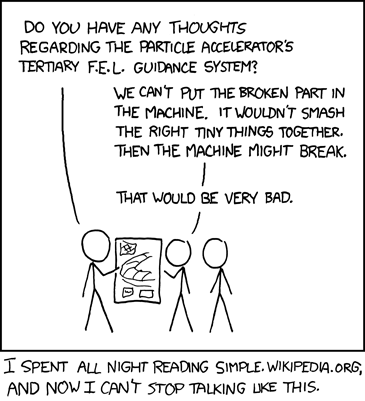 XKCD recently published a comic entitled Up Goer Five which took the form of a set of blueprints for the Saturn 5 rocket and the Apollo Command and Lunar Modules, but explained using only the one thousand (or “ten hundred”) most common words. “Exhaust nozzle” becomes “Fire comes out of here”, “Crew capsule” becomes “People box” and so on.
XKCD recently published a comic entitled Up Goer Five which took the form of a set of blueprints for the Saturn 5 rocket and the Apollo Command and Lunar Modules, but explained using only the one thousand (or “ten hundred”) most common words. “Exhaust nozzle” becomes “Fire comes out of here”, “Crew capsule” becomes “People box” and so on.
I thought this was a great idea, and wanted to try it myself, but it’s very difficult to know instinctively which words are and aren’t in the top one thousand. I was trying to write a macro for Microsoft Word that would highlight the correct words when the solution came in a tweet from Tom Whyntie:
@Alby Nice. I like your Word idea. For simplicity, could you not just create a custom dictionary and run the spellcheck?
— Tom Whyntie (@twhyntie) November 14, 2012
Configuring Microsoft Word for writing like this involves three steps:
- Create a custom dictionary that contains only the top one thousand words. I used this list, but there are many other lists available.
- Tell Word that this dictionary is the dictionary for a language other than the one you’re writing in; you must already have dictionary files for that language installed. (I used “French (Belgium)” because it was first in the alphabetical list.)
- Configure Word to use this language as the proofing language for spell checking.
As Word checks your document it will look for each of the words you’ve used in the software’s built-in dictionary (and won’t find them, because they’re in a different language) and will then check it against your custom dictionary. Words that don’t appear in either the built-in or custom dictionary will then be highlighted as misspelt.
HOWTO
Navigate to the File → Options → Proofing menu and click the “Custom Dictionaries” button.
Create a new custom dictionary. In this example my custom dictionary is called “top1000.dic”.
Open this custom dictionary with your text editor of choice. If you accepted the default location offered by Word it’s probably located in the \Users\Username\AppData\Roaming directory.
\Microsoft\UProof
Copy and paste your list of words (as plain, unformatted text) into the .dic file and save it.
Restart Word, and go back to the File → Options → Proofing menu. Select your custom dictionary file from the list of custom dictionaries and tell Word that it’s in a dictionary for a language that you’re not going to be writing in. In this example, I’ve told Word that “top1000.dic” is a “French (Belgium)” dictionary as I’m not going to be writing in French.
Create a new document, and set the proofing language for that document to the alternative language that you chose in the step above.
Now as you type Word will highlight the words that do not appear in your Top 1000 list.
Known Bugs:
- This method won’t work if you’re using words which appear in both the language you’re writing in and the second language you’ve chosen for the custom dictionary. As you can see above “Apollo” and “Microsoft” are not highlighted, but probably should be. I think it’s probably best to choose the most obscure language that you have support for installed. Hindi or Japanese would probably have worked better than French.
- This system doesn’t work with stems at all. We probably ought to allow both “road” and “roads” rather than only the singular form.
- Word is configured by default to ignore words written entirely in upper case, and I think it treats Consecutive Words With Capital Letters as proper names and ignores those too. You can see in the example above that “XKCD” and “X”, “Y”, “A” and “B” aren’t highlighted as being errors, and neither is “Apollo Command”.
If you’ve got any feedback, stick it in the comments below.
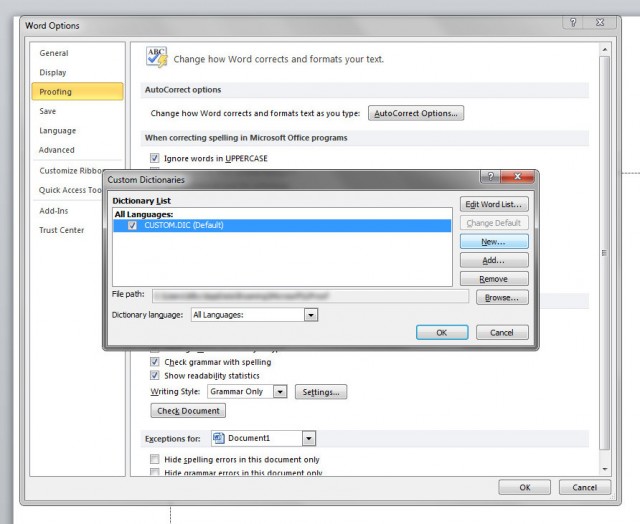
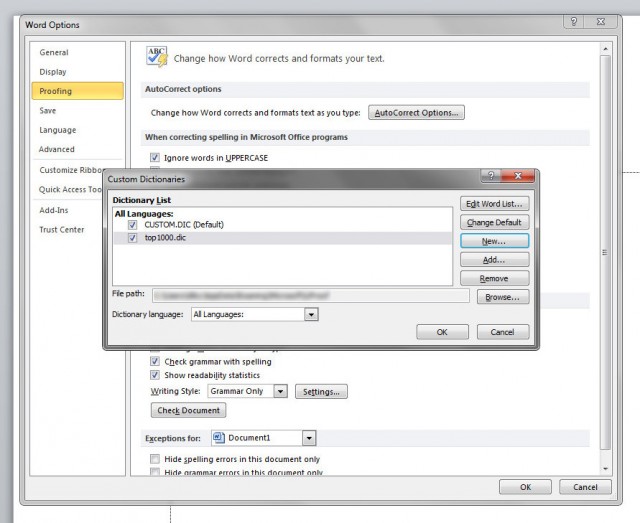
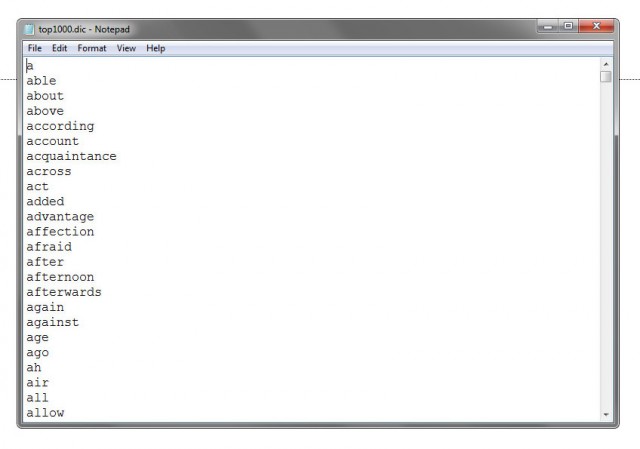
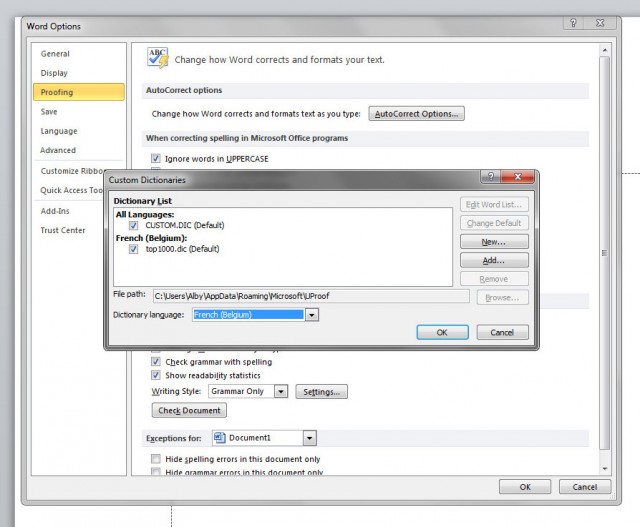
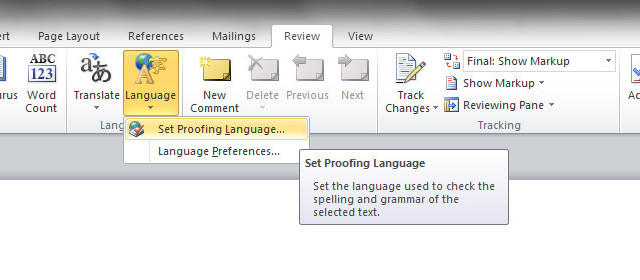

That’s a neat idea and an interesting contribution to the ongoing simple language / jargon debate I see around a lot.
From your example, it looks like Word only ignores Consecutive Words With Captial Letters as proper names in some cases – look at “Tom Whyntie” which it should recognise as One Of These but doesn’t. Could it be that Tom and Apollo are recognised as names and that Command gets by from being on the approved list? If Command isn’t on the list, I’m stumped because it’s not just capitalised words on their own getting through, e.g. “Saturn” is underlined. Unless Word automatically appends a list of approved names to the custom dictionary.
Great idea!
Similarly in OpenOffice.org Writer (Windows XP):
Tools -> Options -> Language Settings -> Writing Aids -> User defined dictionaries -> New… -> Name: top1000 -> set the language to one you won’t use much (e.g. French (Belgium) -> OK
Edit C:\Documents and Settings\\Application Data\OpenOffice.org\3\user\wordbook\top1000.dic
Paste in the words after this top bit:
OOoUserDict1
lang:
type: positive
—
Restart Writer.
Write something. Select all. Tools -> Language -> For selection… -> More… -> Language: [French (Belgium)] -> OK
http://twitpic.com/beod64
Known bug: It marks “People” and “Fire” as misspelled (but “people and “fire” is ok). There must be some setting somewhere.
Thank you for that tip… it was very helpful
would you like to take a look at Jonathan Cole on Youtube and also AE911 experts speak out and give me the benefit of your analysis
its a contrversial topic but i would like to see if you can deal with it based purely on scientific principles. as you are a Physicist can you tell me if you think a 47 story building can colapse due to scattered office fires. Review the videos available onliine and can you tell me if you can accept the official explanation of these events
Anyone that believes that the Twin Towers, or 7 World Trade Center, were brought down in a controlled demolition is either willfully ignorant or an idiot. I absolutely accept the official explanation of these events.
Why not just learn english – or your home language – and use that (and I’m ducking for the response!)
Simple English smells Like George Orwell’s 1984 “Newspeak”! – go careful !
Dumbest idea I’ve ever heard of.